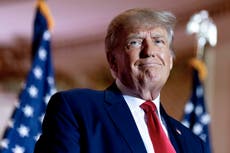Donald Trump’s company fined $1.6m for years-long tax fraud scheme
Former president’s company was found guilty on 17 counts including fraud, conspiracy and falsifying records
Donald Trump’s eponymous company has been fined $1.6m after a New York City jury convicted two Trump Organization subsidiaries on charges stemming from what prosecutors described as a years-long scheme to avoid paying payroll taxes by compensating top executives with lavish untaxed perks.
The December verdict on 17 felony crimes followed an indictment filed last year against the Trump Corporation, the Trump Payroll Corporation, and the Trump Organization’s long-time chief financial officer, Allen Weisselberg, who was sentenced to five months in jail this week.
The former longtime chief financial officer of the Trump Organization had pleaded guilty to several tax crimes stemming from the criminal investigation into the former president’s business empire.
He pleaded guilty to 15 violations of New York tax law in August after prosecutors accused him of participating in a “systemic” fraud scheme and a “sweeping and audacious illegal payment” arrangement in which Trump companies paid him generous benefits – including free rent, luxury car leases, and private school tuition for his grandchildren – that were not reported for tax purposes.
Manhattan District Attorney Alvin Bragg said in a statement on 13 January that Mr Trump’s business “conducted and benefitted from sweeping fraud for well over a decade.”
“While corporations can’t serve jail time, this consequential conviction and sentencing serves as a reminder to corporations and executives that you cannot defraud tax authorities and get away with it,” he added.
Mr Bragg’s office is pursuing a broad criminal inquiry into the company’s financial statements, and the latest sentence “represents a significant chapter of our ongoing investigation” into the former president, he said.
The sentencing includes maximum fines totalling more than $800,000 each against the Trump Corporation and the Trump Payroll Corporation.
The subsidiaries were convicted of three counts of falsifying business records, two counts third-degree tax fraud, and one count each of scheming to defraud in the first degree, fourth-degree conspiracy, and fourth-degree criminal tax fraud.
Mr Bragg suggested other indictments could follow, as he told reporters following Friday’s sentencing that his prosecutors “now move on to the next chapter”.
The former president has spent decades trying to avoid criminal inquiries, accusations and convictions, and has repeatedly accused his political enemies of launching spurious investigations against him despite a growing list of credible allegations of wrongdoing.
But his family business was branded a felon less than three weeks after he formally declared his campaign for the 2024 Republican presidential nomination, a campaign fuelled by grievances and his failure to overturn the election he lost just two years ago, and an effort seen by his critics as an attempt to shield himself from other looming criminal investigations.
The verdict in the Trump Organization case followed an investigation into what prosecutors called a “culture of fraud and deception” within the company.
A statement from Trump Organization at the time laid singular blame on Weisselberg, whom the company said “testified under oath that he ‘betrayed’ the trust the company had placed in him”.
“The notion that a company could be held responsible for an employee’s actions, to benefit themselves, on their own personal tax returns is simply preposterous,” the statement added.
Weisselberg, who first started working for the Trumps in the 1970s, was a key witness to the prosecution in the Trump Organization case against his employer as part of his plea arragement.
While the resulting fines amount to less than $2m, the convictions could be used as leverage for a blockbuster lawsuit filed by New York Attorney General Letitia James, who accused the former president of “grossly” inflating the value of his net worth by billions of dollars in an effort to fraudulently gain tax benefits and other benefits from insurers and financial institutions.
Her lawsuit seeks to recover $250m in lost revenue and penalties, as well as a judge’s order that would permanently bar the Trumps from holding any offices with businesses in the state. The New York judge overseeing that case has also blocked Mr Trump and his company from transferring assets without first notifying the court and the attorney general’s office. An independent monitor is overseeing compliance with the order.

Bookmark popover
Removed from bookmarks